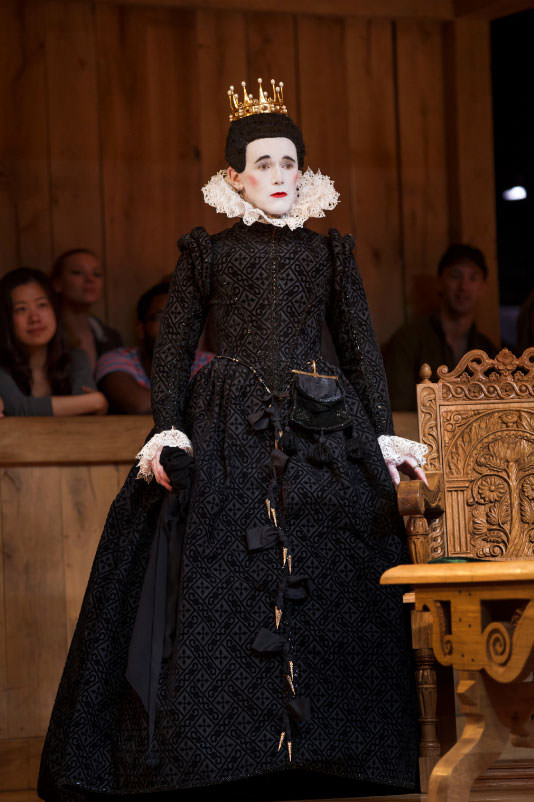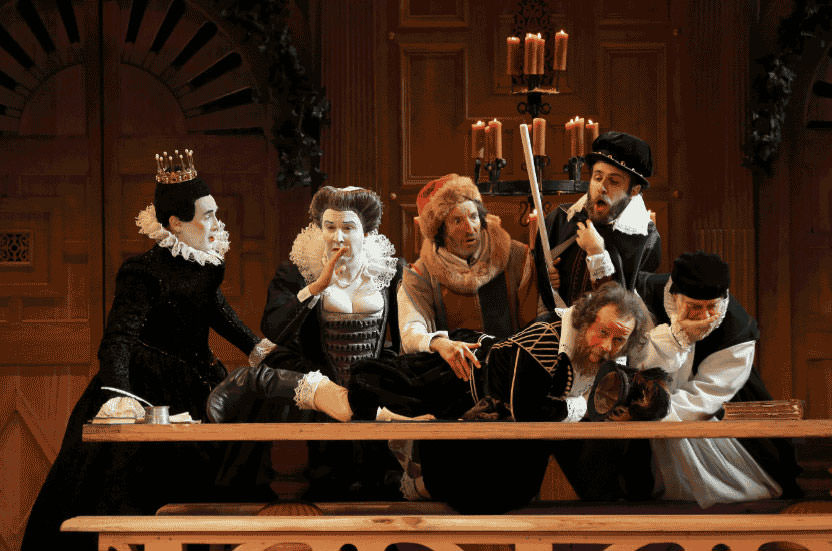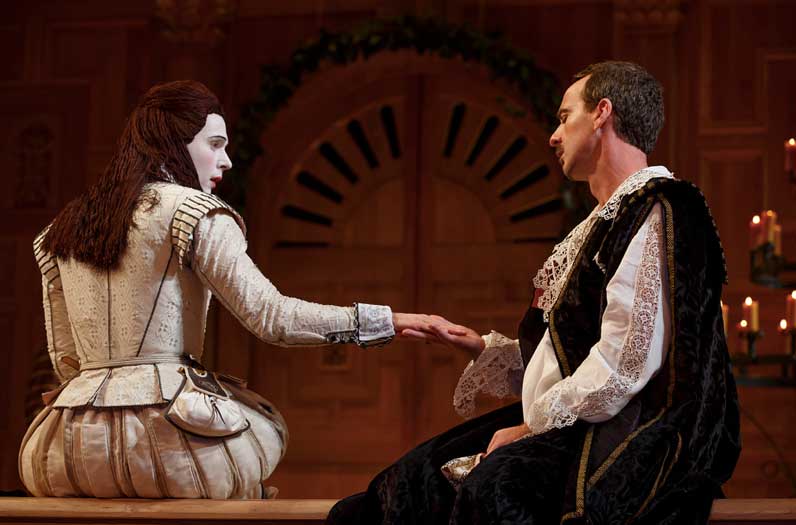The production of Shakespeare’s Twelfth Night by the English theatrical company Shakespeare’s Globe, currently at the Belasco Theatre, brings this play to life in a way I have only very rarely seen equaled in a Shakespearean production. The performances are so uniformly skillful, the interpretation of the play so intelligent and imaginative, and the costumes and stage set so accurate and evocative that the entire experience is exhilarating. Audiences at the performances I’ve attended have been overcome with delight, clearly somewhat surprised by the affecting immediacy of the theatrical experience they have undergone, unaccustomed to a Shakespeare so readily comprehensible and so vividly alive. You may, if you’re lucky, see another Shakespearean production that’s as good as this one, but it’s unlikely you will ever see one that’s better.
From the very outset, we are deftly drawn back into another, earlier world. The stage, dominated by a handsome reproduction of the early Jacobean oak screen at the entrance to the Hall at Merton College in Oxford, with part of the audience seated in temporary wooden stands on either side, recreates the ambiance of some Jacobean hall, whether at the Inns of Court or in some noble house, where Shakespeare’s plays were sometimes performed. For half an hour before the play begins, we watch as the actors are dressed in their costumes, as the musicians warm up with their period instruments, and as candles are lit in the chandeliers. The evocation of an early Jacobean performance is brilliantly achieved, not only with the stage set, the costumes, and the immediate presence of the audience, but also by having men dressed to play the parts of women, as was traditional until the reign of Charles II.
The elegant costumes, especially Olivia’s Spanish farthingale, lavish petticoats, and magnificent black silk-velvet robe, have, as a program note explains, been created with scrupulous authenticity (“no zips, no velcro”), each outfit requiring “between ten and twenty specialist craftspeople” for its creation. Even the undergarments, invisible when the actor is fully dressed, are completely authentic. This production is as faithful to its period as the performance is to Shakespeare’s text.
The earliest recorded performance of Twelfth Night took place on Candlemas (February 2), 1602, in the last year of Elizabeth’s reign, at the Middle Temple of the Inns of Court, although there is reason to suppose there had been at least one prior performance, possibly on Twelfth Night itself (January 6). Twelfth Night, the feast of the Epiphany, celebrating the presentation of the Christ child to the three kings, was one of the major feasts of the medieval and Tudor church, usually of greater importance than Christmas, as it is even today in some countries.
By Elizabeth’s time, it had long since become an occasion for merrymaking, bringing the Christmas holiday to a close, and it was traditionally presided over by a Lord of Misrule, usually chosen with a bean hidden in a cake. The comic spirit of the occasion was that of the world turned upside down, the Lord of Misrule deposing whoever was in authority (claiming justification from the Magnificat: “deposuit potentes de sede, et exaltavit humiles”—“He hath put down the mighty from their seats, and exalted them of low degree”), and actions being performed in some sort of topsy-turvy reversal, creating carnival disorder. So, in Shakespeare’s play, a man plays a girl pretending to be a man, a lover takes perverse amorous satisfaction in unrequited love, identical twins are confused, a belligerent nitwit assumes he is so attractive that a countess will marry him, a servant imagines he is worthy of being made a noble, cakes and ale triumph over virtue, and so forth.
As in Downton Abbey and other British TV soap operas, the fictive world of Illyria depicted in the play has an upstairs and a downstairs, and Shakespeare’s great German translator, August Wilhelm Schlegel, contrasted the “ideal follies” of the one with the “undisguised absurdities” of the other. Upstairs are the elevated households of Duke Orsino and Countess Olivia; downstairs is the inebriate world of Sir Toby Belch and Sir Andrew Aguecheek; and the self-delusory steward Malvolio is hopelessly caught between the two.
In both realms, the central characters are all, to a greater or lesser degree, somewhat mad, the only person with a clear-eyed rational appraisal of the situation being Feste, the fool, whose down-to-earth if somewhat enigmatic song, which has by now become encrusted with scholarly exegesis, ends the play. The various types of folly personified by Orlando, Olivia, Viola, Toby, Andrew, Maria, and Malvolio have often caused them to be represented onstage as caricatures; but one of the secrets of this production’s success is that it depicts the dramatis personae not as two-dimensional caricatures but as three-dimensional characters—real people, who grow and change, suffer and triumph or fail, and to whom we readily give our credence.
Advertisement
Under the inspired direction of Tim Carroll, this Twelfth Night moves at a brisk pace, one scene flowing seamlessly into the next. The fact that there is no necessity for a change of scenery expedites this rhythmic movement. Carroll has clearly conveyed to the actors his profound understanding of Shakespeare’s play, its follies, its celebration of true love and its ridicule of the pretentions of solipsistic love, its high spirits and its gentle melancholy. The language of Twelfth Night is not easy for the modern spectator or reader, as the proportion of explanatory notes to text on any page of the scholarly editions testifies. Yet these actors comprehend that language so thoroughly and are so marvelously at home with it that, even when the words themselves may be opaque, they are able to convey their meaning with elucidating gestures and facial expressions, leaving no one in any doubt about what is being said.
Mark Rylance, who over the past decade or so has made the part his own, is undoubtedly one of the greatest Olivias of all time. Frequently, this part is played with a grave, graceful maturity that tends to mask, or at least minimize, the intensity of the emotional quandary Olivia finds herself in when, not wishing to receive any further expressions of love from Orsino, she discovers she has fallen in love with the messenger who delivers them. Rylance, instead, beautifully exposes her perfervid confusion: overcome with emotion, he stammers (in confirmation of Viola’s observation that “she did speak in starts”), acts with impetuosity, and manifests, at times, an engaging exasperation with his inability to control his passion. His hands alone, in the informative subtlety of their gestures, betray the emotions Olivia wishes to conceal.
The part of Orsino probably offers its actor fewer opportunities than any of the other major roles, but Liam Brennan presents a credible individual, not the caricature of love-obsessed sentimentalism that is often portrayed, and the scene in which he struggles with his discomfiting homoerotic attraction to Viola, mistakenly believing she is a man, is memorably achieved. Viola herself, the strangely, movingly passive heroine of the play, is performed with nuanced discernment by Samuel Barnett, who won thespian fame at an early age in Alan Bennett’s The History Boys. He miraculously achieves, without any gratuitous affectations, exactly the oxymoron that is desired for the part: a masculine boyishness with a feminine allurement.
The great surprise of this performance is the hilarious realization of the character of the serving maid Maria by Paul Chahidi. He makes her the very embodiment of the French word maligne: shrewd, sly, wily, mischievous, cunning, malicious. At the same time, he causes her to inspire in us great sympathy, indeed, affection for her. And even when he is coquettish or smirking, there is never the faintest hint of camp or drag about Chahidi’s portrayal: he becomes a woman, even more successfully than Rylance does, not a man playing a woman—whereas, in contrast, Viola is, intentionally, always a woman reluctantly playing a man.
From the earliest performances of Twelfth Night, Malvolio has tended to threaten the balance of the play by taking over as protagonist. The first description of the plot we have from someone who had seen the play speaks of nothing else in it but the episode in which Olivia’s steward is duped into wearing yellow stockings, believing this will please his mistress; yet Maria’s delicious gulling of Malvolio, however entertaining, is simply not the play’s primary focus. One of the many merits of this production is that Stephen Fry, certainly the finest Malvolio I have ever seen, does not attempt to usurp center-stage.
A Victorian playgoer, Henry Morley, once said of a Malvolio of his day that “it is enough for him to contemplate the excellence within; walled up in his own temple of flesh, he is his own adorer”—and that describes Fry’s persona perfectly. “Best persuaded of himself,” as Maria puts it, he exudes lofty disdain for others, humorless grandeur, and unshakable self—esteem. Fry, unlike other actors who have interpreted the role, never descends to farce, slapstick, or any comic absurdity that would cost him the slightest shred of his imperious dignity, and his impassive maintenance of superiority, even in his attempts at smiling, only intensifies the comedy.
In the beautiful introduction to this play she provided for the Riverside Shakespeare, Anne Barton emphasizes the unreal quality of Illyria with its carnival exemptions from normal behavior, and she compares it to the forest of Arden in As You Like It, the Athenian wood in Midsummer Night’s Dream, and the enclosed park of Navarre in Love’s Labors Lost—all “fantasy worlds…where life has some of the qualities of a dream.” Those fantasy worlds, she says, provide a “magical environment in which characters are transformed, but which they must leave at the end of the comedy to take up the burden of the everyday.”
Advertisement
Twelfth Night, standing on the border between the Elizabethan and Jacobean eras, is the last of Shakespeare’s sunlit comedies. Arthur Quiller-Couch went so far as to call it his “farewell to comedy.” Those that follow, Troilus and Cressida, All’s Well That Ends Well, and Measure for Measure, are not so much sun-drenched as shaded with chiaroscuro, and the first hints of such shadows appear in Twelfth Night, most especially in the scene in which Feste, pretending to be a priest, torments the imprisoned Malvolio, but also in the final recognition scene, where, as Barton points out, “Orsino simply accepts a woman he has never, in fact, seen. Olivia accepts as husband a stranger she has mistaken for someone else.”
The joyful resolutions at the end of Twelfth Night are possible only within its fantasy world, and significantly, unlike earlier comedies, this one does not return its characters to the real world at the end. They are left in the timeless, ideal, unreal world of Illyria, while we, the audience, are gently ushered by Feste’s concluding song back into the more imperfect everyday world of a rake’s progress, where love is less good-natured and the weather less fine.
Part of a larger essay on Shakespeare that will appear in the coming issue of The New York Review and that will include commentary on the recent Met production of Falstaff. Shakespeare’s Twelfth Night, directed by Tim Carroll and produced by Shakespeare’s Globe, London, is playing at the Belasco Theatre in New York City, through February 16, 2014.





